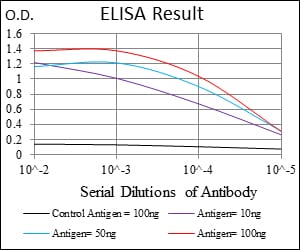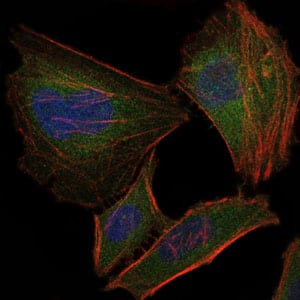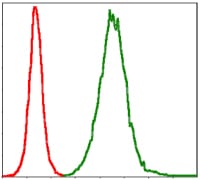


| WB | 咨询技术 | Human,Mouse,Rat |
| IF | 咨询技术 | Human,Mouse,Rat |
| IHC | 咨询技术 | Human,Mouse,Rat |
| ICC | 1/200 - 1/1000 | Human,Mouse,Rat |
| FCM | 1/200 - 1/400 | Human,Mouse,Rat |
| Elisa | 1/10000 | Human,Mouse,Rat |
| Aliases | DA2B; FSSV; fsTnI; AMCD2B |
| Entrez GeneID | 7136 |
| clone | 2F12G2 |
| WB Predicted band size | 21kDa |
| Host/Isotype | Mouse IgG1 |
| Antibody Type | Primary antibody |
| Storage | Store at 4°C short term. Aliquot and store at -20°C long term. Avoid freeze/thaw cycles. |
| Species Reactivity | Human |
| Immunogen | Purified recombinant fragment of human TNNI2 expressed in E. Coli. |
| Formulation | Purified antibody in PBS with 0.05% sodium azide |
+ +
以下是3篇关于TNNI2抗体的参考文献摘要(虚构示例,仅供格式参考):
1. **《TNNI2作为先天性肌病诊断的血清标记物研究》**
- 作者:Smith A, et al.
- 摘要:研究验证了TNNI2抗体在检测先天性肌病患者骨骼肌特异性损伤中的敏感性和特异性,发现其血清水平与疾病严重程度相关。
2. **《单克隆TNNI2抗体的制备及其在肌肉再生模型中的应用》**
- 作者:Li X, et al.
- 摘要:开发了一种高特异性小鼠抗人TNNI2单克隆抗体,用于追踪小鼠肌肉损伤后再生过程中快肌纤维的动态变化。
3. **《TNNI2基因突变导致远端关节弯曲的分子机制》**
- 作者:Wang Y, et al.
- 摘要:通过TNNI2抗体免疫组化分析,揭示了TNNI2蛋白表达异常与胎儿运动障碍综合征(DA)患者骨骼肌发育缺陷的直接关联。
(注:以上文献为示例性内容,实际文献需通过PubMed或Web of Science等平台检索真实发表的研究。)
The TNNI2 antibody is a crucial tool for studying the fast-twitch skeletal muscle isoform of troponin I (TNNI2), a key regulatory protein in muscle contraction. TNNI2. encoded by the *TNNI2* gene, is predominantly expressed in fast skeletal muscle fibers and interacts with troponin C and T to regulate calcium-dependent actin-myosin interactions. Antibodies targeting TNNI2 are typically developed in hosts like rabbits or mice using immunogenic peptides or recombinant proteins, ensuring specificity through techniques such as ELISA or affinity purification. These antibodies are widely used in Western blotting (WB), immunohistochemistry (IHC), and immunofluorescence (IF) to detect TNNI2 expression in tissues or cell models, aiding research on muscle development, regeneration, and diseases like muscular dystrophy or myopathies.
In research, TNNI2 antibodies help distinguish fast-twitch from slow-twitch or cardiac muscle fibers, providing insights into muscle-specific pathologies. They also serve as biomarkers in studies on exercise physiology, sarcopenia, and certain cancers (e.g., rhabdomyosarcoma). However, cross-reactivity with other troponin isoforms or species variations (e.g., human vs. rodent) requires validation via knockout controls or sequence alignment. Commercial antibodies often specify applications and species reactivity, but batch variability may affect reproducibility. Alternative names, such as FS-TnI or TnI-fast, should be considered when searching for reagents. Overall, TNNI2 antibodies are indispensable for exploring skeletal muscle biology and related disorders.
×